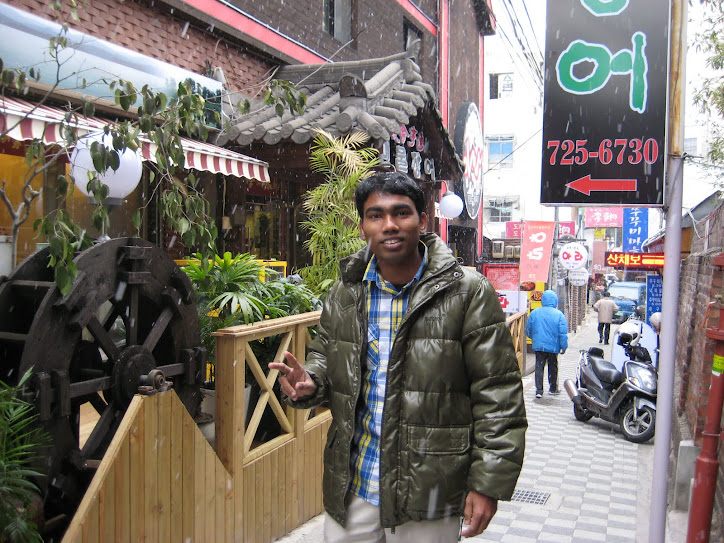South Korean President Lee Myung-bak took up office in February 2008, after having scored a record victory margin in December's presidential election with his "Economy, First!" pledge.
Previously the CEO of Hyundai Construction and a former mayor of Seoul, Mr Lee is nicknamed "The Bulldozer" for his forcefulness. He has promised to boost growth, cut high youth unemployment and raise competitiveness in the face of challenges from China and Japan. His Grand National Party won control of parliament in elections in April 2008, which observers predicted would allow him to push through his economic reforms. However, his approval ratings plummeted after he agreed to resume US beef imports in order to secure a free trade deal.
He was forced to apologise for failing to heed public concerns, and the domestic crisis sparked by the row over US beef imports is thought to have reduced his chances of implementing other promised reforms. In the autumn of 2008, Mr Lee warned that the South Korean economy could be even more badly affected by the global credit crisis than it was by the Asian financial crisis of the late 1990s.
Lee Myung-bak is the country's first president with a business background. He entered politics in 1992 and became mayor of Seoul in 2002. Mr. Lee has expressed willingness to meet North Korean leader Kim Jong-Il whenever necessary and has described his attitude to inter-Korean relations as "pragmatic, not ideological". He has pledged to take a tougher line with Pyongyang than his predecessor, Roh Moo-hyun.
As we have mentioned before that President Lee Myung-bak is former CEO of Hyundai Construction and his nick name is "The Bulldozer”, so easily we can assume that President Lee Myung-bak has strict behavior. As Lee stated that he wanted to restore better relations with the United States through a greater emphasis on free market solutions, but two months after his inauguration, Lee’s approval ratings stood at 28% and by June 2008 they had reached 17%.Then U.S.-korea Free Trade Agreement or KORUS FTA, which faces opposition from legislators in both countries. While it was expected that Lee’s agreement during the summit to partiality lift the ban on U.S. beef imports would remove the obstacles in approving the KORUS FTA in the U.S. Many Korean protested the resumption of U.S. beef imports. In the mean time the Korean government issued a statement warning that violent protesters would be punished and measures would be taken to stop clashes between police and protesters. All of South Korea’s former presidents, including Kim Young-sam, Kim Dae-jung and Roh Moo-hyun, saw a decrease in popularity at the end of their respective tenures. But in the early stages of their presidential terms they were powerful leaders, earning approval of over 70 percent each.
Under the Lee myung-bak administration, police are reportedly moving to restrict assemblies and demonstrations depending on their purposes as well as imposing fines on people who refuse on the street demands to present identification. Lee has been called “authoritarian,” “pro-big business and anti labor”. Lee vowed in 2007 to “get rid of” political and “hard line” unions. Amnesty International highly criticized the human rights violation caused by the presidency of Lee Myung-bak. Not only political freedoms but also Lee tried to interfere on press freedoms. The chief executives of Korea Broadcastings Advertising Corporation and the English broadcasting company, Arirang TV have been replaced by government supporters. It has also been suggested that is trying to change the top executive of KBS (Korean Broadcasting System), the country’s most powerful television network.
However I don’t want to criticize of President Lee Myung-bak, as I am trying to find out the actual ideology or political view of President Lee Myung-bak. Although I’ve already discussed about his some recent activities but still we have some remain. If we say that President Lee Myung-bak is doing liberal minded presidency then it will be right? Our conclusion says that Lee’s Political Background is from Grand National Party and that political view is conservatism which we could see on Lee’s presidency. But the Grand National Party also liberal conservatism but which we haven’t seen Lee’s presidency. Actually I think that President Lee’s presidency is so strict and conservative. According to the rule of “pro big business and anti labor” we can say that Lee’s presidency implying to “the rich get richer and the poor get poorer” (부익부빈익빈).
It may prospective advantages for a country when the peoples of country follow their president. But in Korea we have seen for several times that people are doing demonstrate against the president. Although that doesn’t mean that President Lee Myung-bak is going to wrong way. Because as we’ve mentioned before that President Lee Myung-bak has promised to push through economic reforms, so this kind of prospective idea can give a good achievement for Korea and as Lee’s presidency has forced for 3 years; so still we have to see for remaining 2 years to do comments on his presidency. If we analyze to presidency of Lee’s first year then we can say that he is going to follow the presidency rule of Park Chung-hee
JP



No comments:
Post a Comment